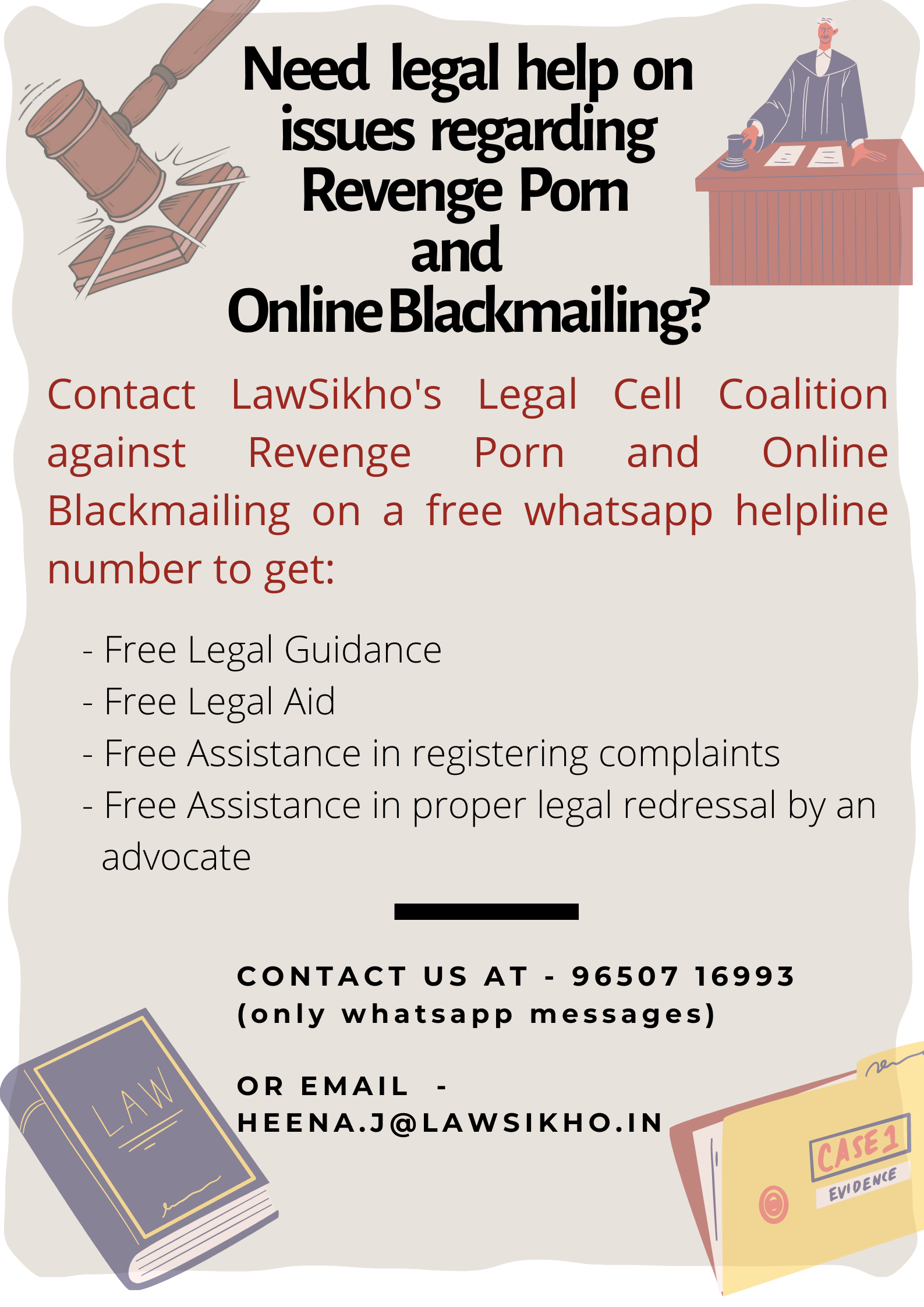This article is written by Sneha Singh from Dr Ram Manohar Lohia National Law University, Lucknow. The article aims to provide some information on what all a victim whose private pictures (nudes) have been shared can do.
Table of Contents
Introduction
One morning you get up and start scrolling social networking sites and to your horror, you find that a picture of yours is circulating and it is not some normal photo but a photo which you won’t want anyone to see, a photo which is extremely private for you. Yes, it’s your nude pictures. Nothing can be more tormenting and terrifying than this. Thinking about it can give you goosebumps and it can be like your worst nightmare. But this is not impossible to happen. So many people are victims of this heinous crime. Some people can tackle it and some end up giving up their lives.
The surge in COVID-19 cases has also seen a rise in cases relating to online harassment of various kinds including child pornography, sextortion, online blackmailing etc. According to a survey, eight out of 10 people in India have experienced some form of online harassment, with 41% of women have experienced sexual harassment in cyberspace. Data which was published in Forbes mentions that the search for the word “nudes” alongside the term “Coronavirus” has seen a tremendous rise.
But while thinking about it there are few questions which come to our mind. How can this happen? Whose fault it was? Is the victim responsible for it and can be blamed by society? What should a victim do? To whom one should approach for help? What are the laws that protect the victim?
 Source by which nudes were leaked
Source by which nudes were leaked
The first question which comes to mind is how can these photos be leaked in this manner? This is a question which however horrifying one needs to answer. There can be two answers to this question:
- First, the photos were stored in your phone and you became a victim of some cybercrime due to which it was leaked.
- Secondly, the photos which you have shared with someone you were in a relationship with or someone whom you trusted.
In the first scenario, one cannot anticipate this coming. In the second scenario even though the victim made a mistake by sharing the nudes, he/she never expected or wanted the images shared by him/her to become public. There are so many voyeuristic websites out there from where these photos can be copied and posted on several other websites. This makes it quite difficult to trace the source of the problem. Nevertheless, it is important to try to remember if such photos were ever shared with anyone or not.
There is one incident where a woman in Bengal had some nude pictures of her in her phone and she dropped the phone by mistake. One stranger got his phone and he took those photos from her phone before returning the same. In this manner, her nudes were leaked and she ended up committing suicide. This is something very unexpected and none can anticipate that images can be leaked in this manner too.
Steps that can be taken by the victim
The problem has already been caused, now it becomes important to look for the remedies. There are a few things a victim can do to resolve the issue:
Not your fault
The first thing which the victim needs to realise is that it is not their fault. When anyone is in that situation, they start blaming themselves which is a human tendency. There is fear that people around them will blame them, and their reputation will be ruined. These concerns many times lead to victims committing suicide. But the victim needs to understand that even if they have shared their nudes with someone and that someone publicises it or threatens to publicize it, still it is not the fault of the victim because they never consented for their private pictures to be made public. The person who makes such photos public is to be blamed as he had not only broken the trust of the person but also invaded his/her privacy.
Talk about it with someone who can help
It is necessary to talk it out with someone who can understand the situation and guide you. That person can be your parents, some trusted relative, a councillor whomever you can place trust on. They might be angry, shocked but you have to tell them as they will ultimately find out about it from somewhere else so better tell them yourself and you can get help from them.
Do not delete the evidence
When you receive your nudes or see them circulating online on some social networking sites what would be your first reaction. Of course, it would be a shock and you may want to delete it but that’s the mistake that you have to avoid as it is the evidence that would help you in future when you file an F.I.R. so always first take a screenshot. If you had any communication with the person who uploaded your nudes or is blackmailing you, take a screenshot and have a record of all the communication.
Contact the websites
The first priority for the victims in such cases is to get the images removed from that website which could prevent its further spread. So a request should be made to the website where those pictures are posted. The victim can get an injunction from the court to stop the images from being published elsewhere. If you are tagged in a post first untag yourself then report on the site. You can contact Google to remove the images and other information from search results.
Most of the sites these days provide for an option to report and after that, they may straight away remove the contents. Some sites also take steps against the person who posted it by either suspending their account or deleting it. Few websites even ask for money to remove the pictures which is itself an offence.
New websites are emerging every day, some of them may not have policies concerning the ban of image-based abuse. If the website where your image is posted does not have a way to report image-based abuse, check their terms and policies thoroughly which are located usually in the footer of the website. Look out for rules which address nudity, harassment, non-consensual sharing of images or image-based abuse, and a way to report them. If they have no such policies it is not advisable to contact them directly. Even if contacting the website directly, not to share any of your personal information with them like your email address (if sending a mail uses a different email than which you normally are using), ID etc. One should avoid providing personal information because many times they try to humiliate them by posting their personal details, email addresses and removal requests.
File a complaint
A complaint needs to be filed by the victim. At times, the victims are hesitant due to social stigmatisation but they have to do this as they will not only be saving themselves but also those people who in the future can be a victim of such crime by that perpetrator. There are three places where a complaint can be lodged against the suspect in any city:
- Cyber cells- They are specially established to help the victims of cybercrime. The crime investigation department has to deal with such crimes. If there is no cyber cell in the area where you live, you can file an FIR at a local police station. If you are facing any issue in getting your FIR filed, you can approach the police commissioner as it is a compulsion for the police station to register an F.I.R.
- The National Commission for women- This organisation’s role is to help the victims of online harassment to deal with the police. The powers of the commission include- the power to set up an inquiry committee, which is empowered to conduct spot inquiries, collect evidence, interrogate witnesses and summon the accused to expedite the investigation.
- Can report on social media websites- The victim can also report about it on the social media website. Most of the websites provide an option to report the crime and are obliged to take action within 36 hours and stop it from spreading as obligated by the IT Rules 2011.
Laws that can protect the victim
Certain laws are made to protect the victims. When the crimes are increasing at an alarming rate it becomes pertinent to be aware of the rights and that the law is there to aid you. In the situation where the nude or obscene pictures of the victim are uploaded without consent, the accused can be held liable under different sections of the IT (InformationTechnology) Act and IPC (Indian Penal Code).
Indian Penal Code
- Section 354(C)– This Section amended by the Criminal Law (Amendment) Act, 2013, states that if any man captures or shares the image of women in private space would be punished with imprisonment which should not be less than one year and may extend up to 3 years and shall also be liable to fine. On subsequent conviction, the imprisonment to not be less than three years and may extend up to seven years and would also be liable for fine.
- Section 500– This Section provides for punishment for defamation. The person who defames another is liable to be punished with simple imprisonment for a term that extends to two years or with a fine or both.
- Section 504– This Section deals with intentional insults provoking a breach of trust. The punishment under this section extends to up to two years of imprisonment or fine or with both.
- Section 506– This Section provides for punishment for criminal intimidation.
Information Technology Act
- Section 67– The Section deals with punishment for publishing or transmitting obscene material in electronic form. The punishment for the offence extends to three years and with a fine which extends up to 5 lakh rupees. In case of subsequent conviction, the punishment can extend up to 5 years and fine up to 10 lakh rupees.
- Section 67A– The Section provides for punishment for publishing or transmitting material containing the sexually explicit act, etc. in electronic form. The punishment for the offence extends to 5 years and with a fine which extends up to 10 lakh rupees. In case of subsequent conviction, the punishment can extend up to 7 years and fine up to 10 lakh rupees.
- Section 67B– This Section provides for punishment for publishing or transmitting material depicting children in the sexually explicit act, etc, in electronic form. The section aims to forbid all publication, distribution, facilitation and consumption in any manner of child pornography.
- Section 66E– The Section mentions punishment for violation of privacy. This section forbids capturing, transmitting and publishing the image of a person without consent when he/she didn’t expect anyone would capture their image.
Violation of the right to privacy
The Constitution of India guarantees the right to privacy to every person under Article 21 of the Constitution. Hosting and transmitting obscene content is punishable by law through accessing the same is not illegal. The IT Act (Amendment), 2008, criminalizes browsing, downloading, creation and publishing of child pornography. There are questions like why these images are even publicised when they violate someone’s privacy. There is no definite answer to this question. A person who is browsing these adult websites in private cannot be held to be liable for any offence. The focus should not be to restrict the use but to regulate. Regulate it when it is violating someone’s right to privacy as the freedom of one to browse through obscene images online cannot hamper the right to privacy of the victim whose private pictures are being shared without his/her consent.
A victim cannot sit still and see his/her privacy being violated. It is not just shame and shock for the person but also questions are being raised on his/her character. The people around them without knowing who exactly is at fault start blaming them and calling them out by different names. In the Indian society where people can’t even talk about sex openly, the victim has to face shame for the nudes which are circulating without his/her fault. The available legal remedy is not enough.
In these situations, it becomes very important to talk about the privacy rights of the victims and also we must widen our approach to the way we handle these issues.
Conclusion
It is hurtful to find your nudes circulating online but the victim needs to keep calm and have trust in the laws of our country. The society also needs to understand that the people whose nudes are shared are already victims who are themselves suffering and they need consolation and support from the people around them and not their harsh words.
References
- https://www.esafety.gov.au/key-issues/image-based-abuse/take-action/report-to-social-media-website
- https://blog.ipleaders.in/what-to-do-if-someone-has-published-your-nude-pictures-without-your-consent/#comments
- https://www.forbes.com/sites/johnscottlewinski/2020/04/09/social-media-study-reveals-covid-19-isolation-creates-more-nude-photos-dick-pics/?sh=35408b581cc8
- https://au.reachout.com/articles/what-to-do-if-someone-shares-your-nudes
LawSikho has created a telegram group for exchanging legal knowledge, referrals, and various opportunities. You can click on this link and join:
 Serato DJ Crack 2025Serato DJ PRO Crack
Serato DJ Crack 2025Serato DJ PRO Crack











 Allow notifications
Allow notifications


